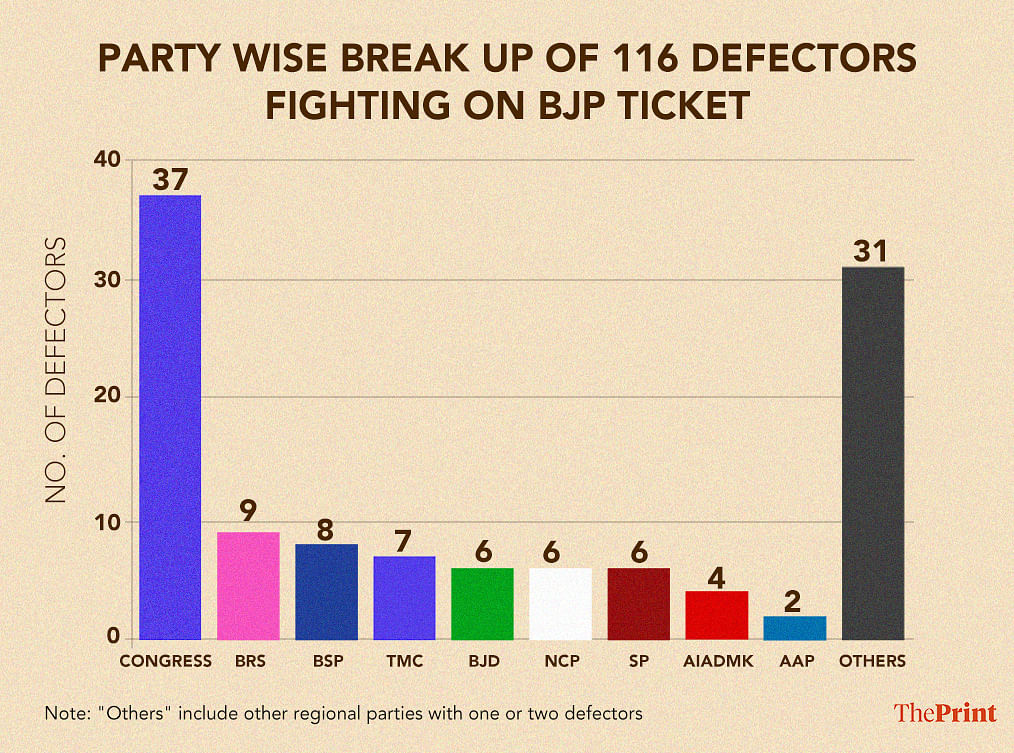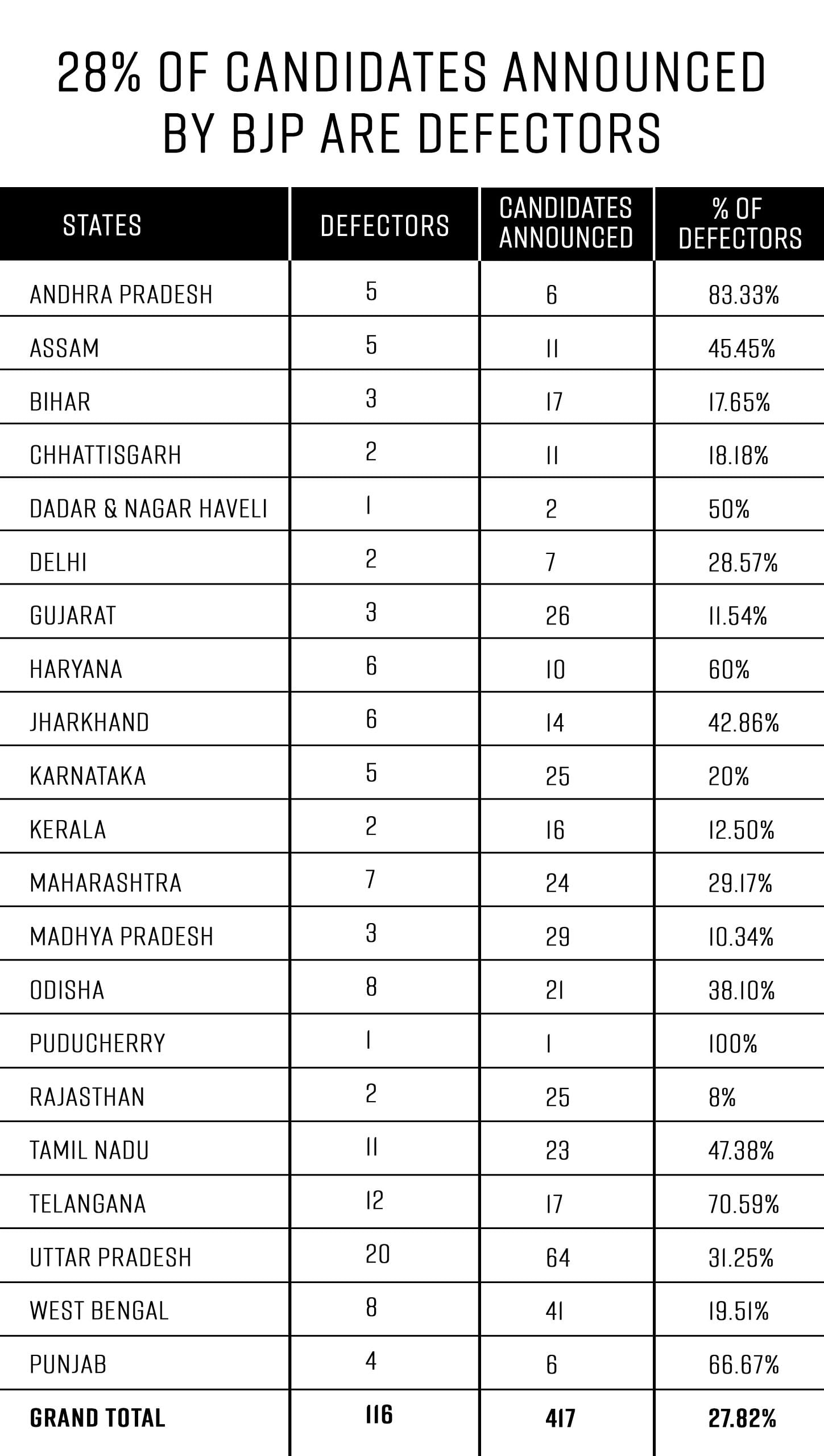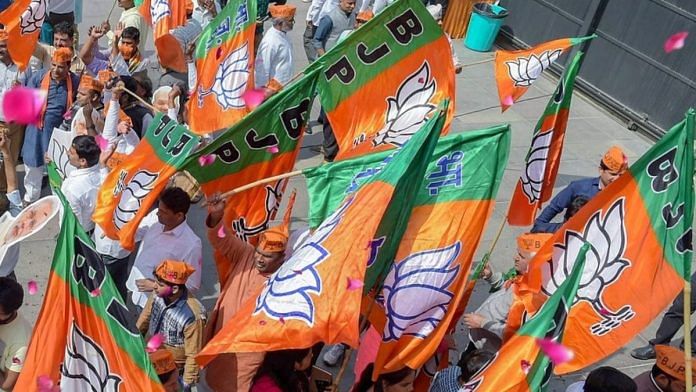New Delhi: One in four candidates of the Bharatiya Janata Party (BJP) in this Lok Sabha election is a defector while a majority of them switched their allegiance from the Congress, ThePrint’s analysis of the background of 417 candidates has found.
The BJP has released nine lists of candidates so far, with the last coming out on 31st March.
Out of these 417, 116 or 28 percent came from other parties. Most of them joined the BJP after Narendra Modi came on to the national centrestage in 2014.
At least 37 defectors are from the Congress, the largest from any party. After the Congress, the maximum candidates are from BRS (9), BSP (8), TMC (7) and BJD (6). NCP (6), SP (6) and AIADMK (4).

The BJP’s decision to induct turncoats is primarily driven by its expansionist agenda in states where it has been traditionally weak. This is, however, beginning to draw protests from within as long-term party loyalists have started opposing such inductions. In Gujarat’s Sabarkanta, for instance, BJP leaders are protesting against the decision to drop the sitting MP Bhikhaji Thakor in favour of the wife of a former Congress legislator who joined the BJP.
“Ever since the party attempted to expand its reach and political footprint, which I would say was since the early 2000s, there was a clear attempt to reach out to sections and leaders who were not necessarily associated with their core agenda,” says Karnataka-based political scientist and Jain University pro vice-chancellor Sandeep Shastri.
He points out that most of these seats are in areas where the BJP has not had a very strong presence traditionally. “So one way of integrating those areas into the BJP fold is by getting such leaders, who will help expand its geographical footprints in that sense.”
It can often lead to the “dilution of the long term commitment to the party’s ideology,” Shastri says. “It could also lead to, as seen in certain places, the absence of what has been a very strong disciplinary foundation in the party.”
But author-columnist Sudha Pai, a former professor of Jawaharlal Nehru University (JNU), says since most of the members are still from within the BJP, it won’t have a long term impact unless the leadership or the party weakens
“Movement from one party to another has become very, very common now. Now in political parties, everything is extremely transactional. That is true for BJP as well,” she asserts. “I don’t think it’ll have a long term impact. 28 percent is not a very large number. Considering that others are all from within the BJP.”
The reason for this, according to her, is that the party is very strong and disciplined. “Unless leadership becomes weakened due to something or they don’t do very well in some (important) parts of the country. I don’t think it will really make an impact.”
BJP national spokesperson R.P. Singh says that candidature selections are done keeping in mind the winnability.
“Election is a different game. Party is a different game. In an election, it’s all about winning,” Singh argues. He adds that in forming the government, the only issue is about getting an MP elected but “when the government is formed, there are 10 other things also”.
“Good people are given good opportunities. Winnability is a necessity to bring members of other parties as well.”
Ninety-nine (85 percent) of defectors joined the party 2014 onwards, coinciding with the Modi-Shah duo at the helm. Further, 64 jumped ship in the election years — 2014, 2019 or 2024.
For instance, Gurgaon MP Rao Inderjit Singh Yadav left the Congress to join the BJP in 2014. So has the case been for Domariyaganj MP Jagdambika Pal from Uttar Pradesh. Union minister Annapurna Devi and BJP vice-president Baijayant Panda have gone places after jumping ships from RJD and BJD in 2019.
As many as 33 candidates like Ashok Tanwar (Sirsa), Sita Soren (Dumka), and Naveen Jindal (Kurukshetra) have barely spent two years in the party. They have been given tickets at the cost of long-time BJP loyalists. They joined either in 2023 or 2024.
But there are also senior leaders like Maneka Gandhi (Sultanpur) who joined the party before the Modi era. After a stint in Janata Dal and having fought as an Independent, she joined BJP in 2004.
Even as her son Varun has been denied a ticket, the former Union minister is set to contest her 10th Lok Sabha elections since 1984. She has won 7 out of the last nine polls.
Another prominent name is Union minister Sarbananda Sonowal (Dibrugarh). He was earlier in the Asom Gana Parishad till 2011. His fortunes changed after joining the BJP and was appointed as Assam chief minister in 2016.
From the Congress camp, the major candidates to switch allegiance include Jyotiraditya Scindia and Jitin Prasada, once considered close to the party high command. While Scindia is set to fight from his traditional seat of Guna, Prasad has replaced Varun Gandhi at Pilibhit in Uttar Pradesh.
Down south, Anil Antony, son of former defence minister and Congress veteran A.K. Antony, is contesting from Kerala’s Pathanamthitta.
“Last 10 years, we have seen unprecedented growth. The country is at an unprecedented tangent. Then we have the opposition parties who are going without any vision or any direction. The Congress party is itself reduced to a unit, which is to work for the welfare of a family,” Antony tells ThePrint. “In contrast, you have PM Modi who is working with a 25-year vision. It is only natural that people who want to contribute towards nation building, will join the party.”
There are also four seats where the candidates from allies are contesting on BJP tickets.
Praveen Kumar Nishad, son of NISHAD party president Sanjay Nishad, is contesting on the BJP symbol in Uttar Pradesh’s Sant Kabir Nagar. The three other constituencies are Vellore (New Justice Party), Perambalur (Indhiya Jananayaga Katchi), and Tenkasi (Tamil Nadu Muslim Munnetra Kazhagam). These four aren’t defectors, but they have been included in BJP’s list as they aren’t from the party.
C.N. Manjunath, former prime minister H.D. Deve Gowda’s son-in-law, is contesting on the BJP ticket from Bengaluru (Rural) constituency. The Janata Dal (Secular) has fielded three candidates on its own symbol as part of the seat-sharing arrangement with the BJP in Karnataka. Manjunath’s name has, however, not been included in the list as he was not in politics until now.
Also Read: Bittu makes it a baker’s dozen — how scions of former Congress CMs have flocked to BJP
Increase in party footprint
After the BJP nearly swept out the Hindi heartland, its focus shifted to east and south to expand footprints. As BJP tries to grow in these states, it continues to welcome leaders like Antony.
In Tamil Nadu, Telangana and Odisha, 31 candidates are ‘outsiders’, mostly from regional parties. In Andhra Pradesh too, five out of six candidates are outsiders including the likes of C.M. Ramesh from its ally Telugu Desam Party (TDP).
Political analyst Shastri believes that these candidates have been fielded in line with BJP’s target of winning 370 seats.
But even in some of the Hindi heartland states, where it’s ruling, the party has relied heavily on borrowed candidates. Twenty of the 64 candidates declared in Uttar Pradesh are outsiders, mostly from regional parties.
However, there has been a decline in such candidates over the years in Uttar Pradesh. While 7 of these 20 candidates joined in the run up to 2014 Lok Sabha polls, 6 in run up to 2019 polls and only 4 between 2020 and 2024. Over the years, the BJP has consolidated itself in the state.

Six out of 10 Haryana candidates are defectors, all having been in Congress at some point or the other. In Maharashtra, 7 out of 24 candidates declared so far are defectors. Similarly in Jharkhand 6 out of 14 candidates are ‘outsiders’ .
Asked about the acceptance of such candidates, Anil Antony does not see any problem. “We joined to work for the party and the PM’s vision for nation building. Party leadership makes decisions keeping in mind the best for the party,” he says. “Everywhere I go, I am receiving very good reception from karyakarta. They are very happy”
He believes that the “world’s largest party” has opportunity for everyone as BJP is working towards such a “monumental task”.
Party spokesperson R.P. Singh gives three reasons on why people joined BJP in these large numbers. First, every “political person thinks where will I get more benefits and what will be right for me going ahead.” Then some people see the condition of the party they are in, he says. There are also those who think to “drive the nation forward, Modi is the right man”.
While Singh denies any negative impact of outsiders joining the party on karyakartas, Shastri believes it depends on how the workers view the joining.
“Does the karyakarta see it as a way of expanding the footprints of the party and contributing to strengthening the leadership in Karnataka? What we have seen is people who migrated to the BJP from other parties…Karyakarta has worked for them… But ultimately, once those people got elected, many a time the MLAs or MPs had little role to play. It was the party workers who then took the call on issues,” the political analyst elaborates.
This led to frustration among the elected representatives which is visible in Karnataka, claims Shastri.
“Also, you are bringing in somebody from another party to weaken that outfit as well. It is not just to strengthen your party, but to weaken the other. And when that goal is achieved, there are instances of those leaders being sidetracked,” he explains.
(Edited by Tony Rai)
Also Read: Why Congress took back Choudhary Lal Singh, J&K ex-minister who supported Kathua rape accused



